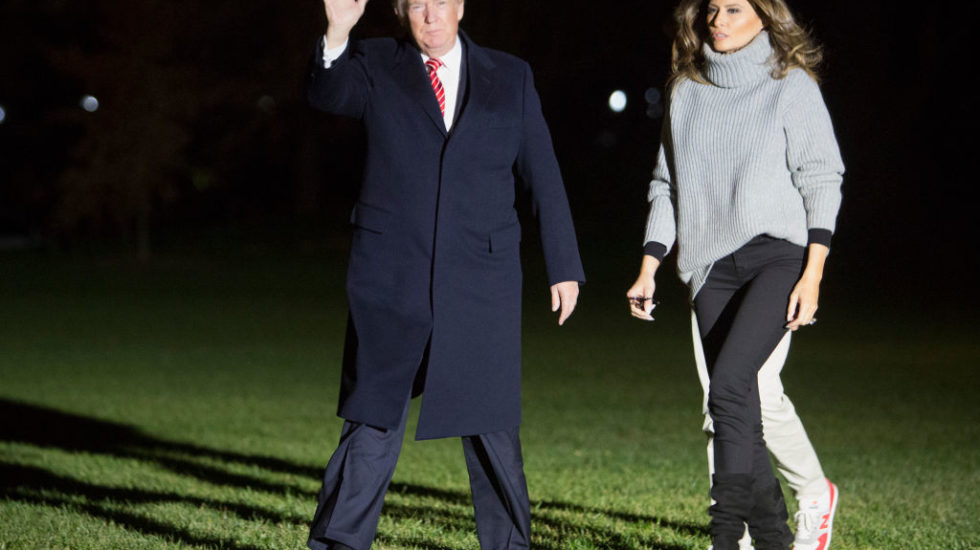What good is it for someone to gain the whole world, yet forfeit their soul? asks Jesus in the Book of Mark.
For evangelical Christians in Trump’s America, that question is no longer an ancient hypothetical.
One of the stranger political developments in a deeply strange political season is the degree to which evangelical Christians have been willing to support Trump despite all manner of what we politely refer to as “character issues.” From the infamous Access Hollywood tape to the alleged payoff of porn star Stormy Daniels to uncharitable attacks on groups and individuals too numerous to name, Trump is easily the least publicly pious president in modern times–and what happens in private, well, God only knows.
And yet evangelicals, who are called to live by and spread the Good News, have responded to Trump’s sinful ways with little more than a shrug. In an interview with Politico’s “Off Message” podcast, Tony Perkins of the Family Research Council says that America’s 80 million evangelical Christians “were tired of being kicked around by Barack Obama and his leftists. And I think they are finally glad that there’s somebody on the playground that is willing to punch the bully.”
If Trump is an imperfect defender of the faith, so what? With respect to Stormy Daniels and Trump’s other transgressions, “We kind of gave him—’All right, you get a mulligan. You get a do-over here,'” Perkins says.
Adds Perkins’ fellow evangelical, Franklin Graham:
Never in my lifetime have we had a @POTUS willing to take such a strong outspoken stand for the Christian faith like @realDonaldTrump. We need to get behind him with our prayers. https://t.co/H640MzsRSj
— Franklin Graham (@Franklin_Graham) December 1, 2017
In return for their support, Trump has rewarded evangelicals–who make up 1 in 3 Republican voters–in numerous ways. Through nominations and appointments, he has elevated fan favorites like Mike Pence, Neil Gorsuch, and a raft of right-wing appeals court judges. He has spoken at the March for Life in Washington, underscoring his support for efforts to restrict abortion rights and de-fund Planned Parenthood. From wedding-cake religious exemptions to an attempted ban on transgender service in the military, Trump has challenged the fundamental protections only recently affirmed for LGBTQ Americans.
But if the president’s policies seem to check all the evangelical boxes, it is also true that the hallmarks of his public life mirror the Seven Deadly Sins to an astonishing degree; for the record, they are pride, greed, lust, gluttony, wrath, envy, and sloth.
The Stormy Daniels episode, in addition to unsavory anecdotes such as the “pretty Korean lady” tale in Michael Wolff’s Fire and Fury, may finally be making a dent in Trump’s once-stalwart support among evangelicals. “According to a Pew poll out in December, Trump’s support has dropped sharply among white evangelical Protestants, from 78 percent in February to 61 percent in December,” Politico’s Edward-Isaac Dovere observes.
And then there’s one other fact to consider, which is that that mulligan may not be Tony Perkins’ to give.
Twenty-six years ago this Friday, Bill Clinton’s presidential candidacy was salvaged when he and Hillary sat for a 60 Minutes interview just days before the New Hampshire primary. In front of millions of post-Super Bowl viewers, the Clintons brushed aside the burgeoning Gennifer Flowers scandal and emphasized the bond of their marriage. Love them or hate them, it was undoubtedly a spellbinding political performance.
Compare that moment with the news today that First Lady Melania Trump has abruptly canceled plans to accompany her husband to the World Economic Forum in Davos, Switzerland, an occasion that coincides with their 13th wedding anniversary. Strain in the First Marriage has always seemed unusually close to the surface, especially for a couple in the public eye. If religious leaders are willing to ignore the allegation that Trump cheated on his wife soon after the birth of their only child together, one wonders whether Melania is as eager to forgive.
Which raises another intriguing hypothetical: Would evangelicals continue to stand by Trump even if Melania did not?



